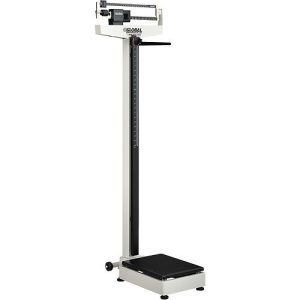
Your scale of medical is providing you with varied responses from the same patient. Again. You are angry, your employees are mixed up, and are even doubting yourself whether your weight-based treatment decisions are correct or not. Faulty scales undermine patient care, waste medications, and establish liability problems.
Most accuracy problems are fixable once you understand what’s causing them. Let’s fix your scale issues with quality medical equipment scales that actually work.
Table of Contents
ToggleFrequent use results in internal components being taken out of factory specifications. The scale requires an entirely straight, solid surface.
The temperature extremes, humidity, corrosion connections, and effects on load cells, air currents caused by vents, and vibrations by the surrounding equipment all pose environmental issues that influence measurements and cause errors, respectively.
Use certified calibration weights. These weights come with certification documents proving their exact weight against national standards.
Before calibrating: place the scale on a level surface, clean the platform thoroughly, let the scale warm up for 15 minutes, and turn off nearby fans or AC vents.
Calibrate in the same conditions every time. Your wheelchair scale needs this consistency for reliable patient measurements.
This happens because user technique varies. Readings are different when your patient shifts his weight or leans on something, or when he is not standing still. It is important to have proper technique, the feet in the right positions, the weight evenly spread, and to stand until the reading is locked.
The digital scales require seconds to compute correctly. Before stabilization, reading ensures that there is consistency.
Your environment constantly affects scale performance. Keep scales between 65-75°F with minimal variation. Avoid windows with direct sunlight, heating vents, or areas with dramatic temperature swings.
Aim for 40-60% relative humidity. High humidity corrodes connections. Low humidity creates static electricity issues.
Yes. The consequences are serious.
Decreased patient confidence, increased legal and liability risks, potential for regulatory compliance issues, and wasted time and resources from re-weighing are key concerns.
The maintenance schedule is as follows: daily, inspect and clean; weekly, perform a spot check with certified weight; quarterly, calibrate and document; and annually, get professional service.
Accuracy in medical scales needs to be a regular and well-processed task. Your problems with accuracy can be corrected through careful calibration, environmental assessment, and routine maintenance, such as weekly spot checks and quarterly complete calibration.
Waiting to have an issue with accuracy to impact patient care is not advisable. Get it checked today, in case you are getting unstable readings or fail to recall when you last calibrated it. Visit BizAutom to improve your current procedures or invest in reliable professional medical scales. Prioritizing accuracy is essential for patient safety and operational integrity.
Sudden loss of accuracy is caused by the physical impact, motion of the scale without recalibration, component failure, extreme temperature, or battery problems. Calibrate with certified weights.
Test using a certified calibration weight. When the reading is not the same as the certified reading within the tolerance of the scale (which is typically 0.1-0.2 pounds), recalibrate.
There are no actual weights of household items. The certified weights that are used should be certified, and the certification document should indicate the exact weight that has been tested against the national standards.
Precision refers to the ability of a scale to give the same value at different times. You need both. A scale could be accurate but incorrect. Calibration is used to get accuracy; Precision is used to get quality construction.
Normal cleaning does not need recalibration. Proper cleaning, including changing the position of the scale or excess liquid, should be followed by checking it with a certified weight.
The positioning of the patient is a great influence. Equally applied weight on the two feet, feet in position, body straight, not leaning, arms at the sides always, no movement of the feet. Sitting or squirming does not allow stabilization. Tracking of the weight must be accompanied by consistent positioning.
Sign up to receive updates, promotions, and sneak peaks of upcoming products. Plus 20% off your next order.